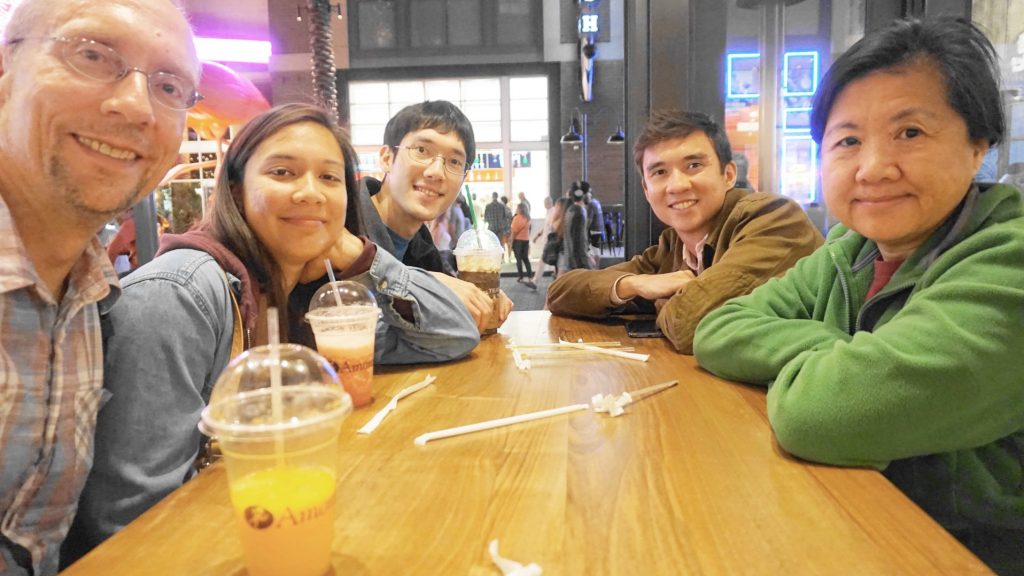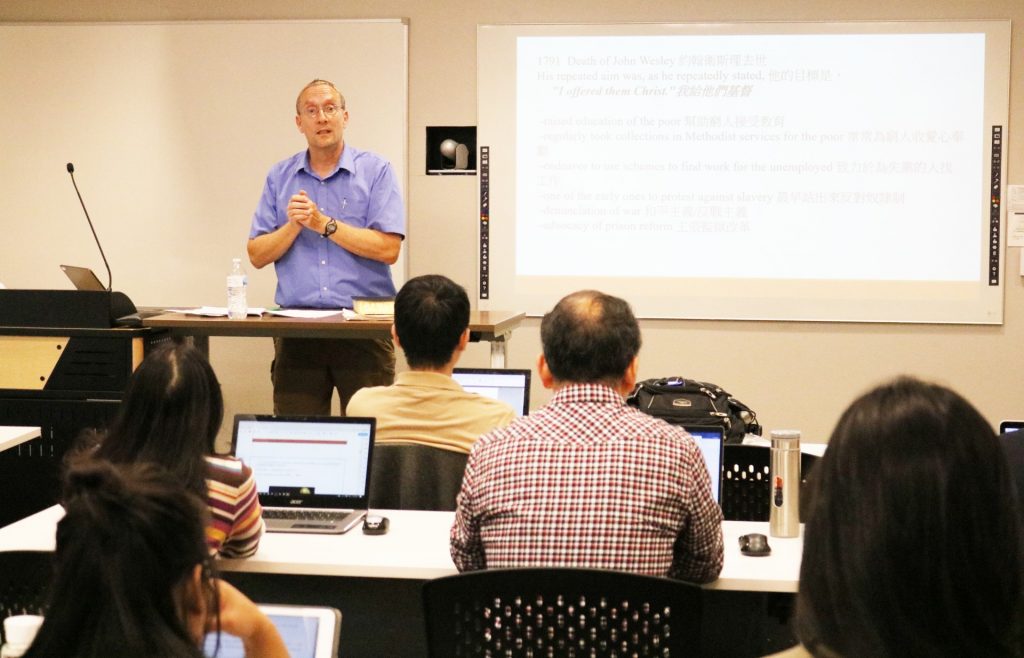Eyes of Faith: Looking to the Future of the Chinese Missionary Movement
Richard Cook(柯立天牧師)/ 跨文化研究碩士科主任
全家福。-copy-940x1024.jpg)
Dr. Richard Cook is Associate Professor of Church History and Intercultural Studies at Logos Evangelical Seminary. In this article Dr. Cook surveys the profound faith of several missionaries in China in 1900. Their exemplary hope in God inspires missionaries today to join the global missionary force. Logos offers the MA in Intercultural Studies program to help students prepare for missions. The MAICS degree can be completed in two years, or it can be combined with the M.Div. degree. The dual degree “3+1” (M.Div. plus MAICS) takes four years to complete.
In the summer of 1900, the missionaries in China faced a dark moment in history. Boxer soldiers unleashed extraordinary violence against the Western missionaries and the Chinese Christians. These desperate and mostly illiterate young peasants targeted Christians because they blamed the West and Western Christianity for the intractable problems, including drought, flooding, and famine, facing China in the 1890s. Starting in Shandong in 1898, the Boxer uprising spread through North China like a wildfire gaining recruits and momentum and flooding into Beijing throughout the summer of 1900.
The missionaries might have despaired, yet they were a model of hope. For missionaries today, they provide an inspiration. There are no circumstances that are beyond the control of God. At that tragic moment, the missionaries in China looked to the future Chinese church with eyes of faith. Their optimism is in marked contrast with the dismal appearance of the situation in 1900.
Why were the Christians despised? The violent murder of thousands of Chinese Christians and many dozens of Western missionaries in 1900 did not occur in a vacuum; it was the culmination of decades of growing hostility throughout China.
The Tragic Nineteenth Century
Robert Morrison arrived in China in 1807. He was the first Protestant missionary, but Christianity had already been rejected in the Chinese Empire. Decades before his arrival, the Chinese Emperor had outlawed the Roman Catholic missionaries and Christianity. Morrison was forced to start his tentative missionary endeavors among the Portuguese traders stationed in Macau on the outskirts of the Empire. At the same time, the British Empire was on the ascent and was pushing trade into all parts of the world. The first Opium War in the late 1830s began to poison Chinese attitudes towards England, the West, and Christianity. The explosive and deadly Taiping Rebellion of the 1850s further distorted Chinese understanding of Christianity. The quasi-Christian Taiping were able to conquer the southern half of China, setting up their capital in Nanjing, and it took the central Qing government in Beijing over ten years to put down the Rebellion.
The utter feebleness of the decaying Qing Dynasty was laid completely bare during the second Opium War. Not only was China unable to resist British military power, but they were not able to protect Chinese sovereignty in their own kingdom. The British successfully forced open trade in China, and they demanded the legalization of Christianity throughout the Empire. China responded with a “self-strengthening” movement that attempted to reform the government and build a modern military. The futility of that effort was exposed when Japan, which had successfully modernized its military, easily demolished the “modern” Chinese military in the Sino-Japanese war of 1895.
Throughout these years, the numbers of missionaries in China continued to grow. In 1865, Hudson Taylor launched the China Inland Mission and ever-increasing numbers of Western missionaries penetrated deeper and deeper into the Chinese inland.
At the worst possible moment, in Shandong province, the Yellow River flooded its banks in 1898. Following the devastating flooding, the next year brought dry weather and a massive deadly drought to Shandong. Although the shallow Yellow River has flooded many times throughout history, it is not surprising that many Chinese people suffering the calamities would blame the West. Looking over the previous several decades, since the arrival of Protestant Christianity, the Chinese could observe wave after wave of tragedy. Many Chinese increasingly believed that the West and Western Christianity needed to be purged from China in order to restore the Mandate of Heaven.
Throughout China, Christianity and the West was increasingly despised. The Boxer soldiers of Shandong in 1898 represented a particularly virulent expression of that anti-western and anti-Christian hostility. Few Chinese people, especially in the rural areas, could differentiate the British opium traders from the Western Christian missionaries. For their part, the missionaries also made many mistakes, leading to even deeper animosity against both the missionaries and the Chinese Christian converts.
By 1900, the missionaries already faced an almost insurmountable task. Christianity had to overcome many decades of misperceptions and anti-Christian prejudice. Then, in 1900, the Boxer soldiers participated in a slaughter of Chinese Christians and Western missionaries. All over China, terrified missionaries feared for their lives. They were forced to abandon their posts on the inland, and many Westerners and Chinese Christians attempted to retreat to the protection of British legation in Beijing.
Eyes of Faith
Missionaries, in this context, could be forgiven if they despaired. They and their families were in mortal danger, as were their Chinese converts. They had come to China because of their love for the Chinese, but now it was the Chinese people who despised them, and in some cases wanted to kill them.
Understanding they may face death, many missionaries penned letters to home. Let us look at four letters that express stunning faith in God.[1]
Miss Bird encourages her loved ones to remember, even if she is killed, not to despair.
“If you never see me again, remember I am not sorry I came to China.”
Miss Susan Rowena Bird
Mrs. Atwater offers an unexpected perspective on her coming death.
“I do not regret coming to China, but I am sorry I have done so little.”
Mrs. Elizabeth G. Atwater
Rev. Lundberg reflects a deep spiritual faith in the teachings of Jesus.
“We live and die for the Lord in China.”
Rev. Carl L. Lundberg
Rev. Pigott, by faith, looks deeply into the future.
“How shall we look on the investment of our lives and labor here, even from the near standpoint of one hundred years hence?”
Rev. Thomas Wellesley Pigott
At that moment, all appearances were to the contrary; nonetheless, Rev. Pigott trusts that, someday, there will be a thriving Chinese Christian church. In 1900, he was writing, by faith, about the harvest that we witnessed in China between 1990 and 2010. I believe as he was looking forward, he envisioned the students I have the privilege to teach today at Logos Evangelical Seminary.
China: One Hundred Years After 1900
Even after the Boxer uprising of 1900 was suppressed by Western armies, the church continued to experience an unrelenting series of crises. Christianity was opposed by the illiterate and superstitious Boxers in 1900, and they were later opposed by the modern educated elite in the 1920s during the May Fourth Movement. China suffered through both World Wars, and under the Japanese occupation. Intense pressure was placed on the Chinese churches after 1949, and the church was officially outlawed throughout the Cultural Revolution. Although many outsiders in the West thought the church had died under communism, in the 1980s the church experienced revival.
The 1980s also brought the beginning of an economic miracle in China. As millions of Chinese were lifted out of poverty, the churches enjoyed continued growth and numerous pockets of unprecedented revival. By the late 1990s the highly secretive rural house churches were migrating to the urban areas and were augmenting the burgeoning and sophisticated city churches. These churches in China, in turn, were connecting with the global Chinese diaspora. Chinese communities around the world had been experiencing healthy Christian growth since at least the 1950s.
The Chinese churches around the world were part of an even larger movement of God to build global Christianity. By 2000, the Chinese churches were poised to join the global church in an endeavor to bring the gospel of Jesus to every unreached people group. I believe, in 1900, Rev. Pigott was envisioning everything that was happening in 2000!
The Chinese churches, as we approach 2020, are now mobilizing for missions. There are large swathes of the world that are still unreached for Christ. Those unreached peoples are usually located in the most difficult places for missionaries to go. They live in parts of the world where missionaries and Christians are despised. If a missionary is to serve Jesus in that context, they must have eyes of faith.
Conclusion
How will we spend our life? Rev. Pigott gave his life in 1900, but he was part of a missionary project that is still in the process of transforming China. In a poem penned by C.T. Studd, a well-known missionary who arrived in China in 1885, we are reminded:
Only one life, ’twill soon be past,
Only what’s done for Christ will last.
[1] These quotes are from a small OMF publication compiled by Sik Pui Wong, “In Remembrance of Martyrs a Century Ago: Last Words and Letters from the Missionary Martyrs of the 1900 Boxer Incident.” ✤


